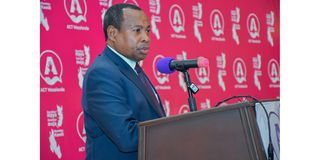ACT Wazalendo unveils shadow cabinet to enhance accountability and citizen engagement

ACT- Wazalendo's Vice Chairman and Zanzibar's first Vice President Othman Masoud Othman during the unveiling of the shadow cabinet in Unguja, Zanzibar.
What you need to know:
- The decision to establish the shadow council was driven by the political environment observed after the 2020 elections, which the National Executive Committee believes has resulted in a quasi-single-party system.
- This situation, they argue, has reduced the diversity of voices in legislative bodies, necessitating a robust mechanism for effective checks and balances.
Unguja. The Opposition party ACT Wazalendo has officially established a Sectoral Spokesperson Council, also known as a shadow cabinet to rejuvenate democratic oversight and ensure effective governance.
At the unveiling event in Unguja today September 6, the party chairman, Mr Othman Massoud Othman, described the development as a pivotal step in the party’s commitment to upholding the values of the Zanzibar Constitution and amplifying the voices of the people in governance.
“The creation of the shadow council aligns with the principles of the Zanzibar Constitution.Article 9(2)(a) asserts that 'The authority to govern the country rests with the people themselves,' emphasizing that government power is derived from the people,” said Mr. Othman, who is also the First Vice President.
He further highlighted Article 10(b), which underscores the necessity to "eliminate corruption and the misuse of office against the public," stressing the importance of transparency and accountability in governance.
According to Mr. Othman, ACT Wazalendo’s party constitution supports these constitutional goals. Article 7 outlines the party’s objectives, including advocating for constitutional values and serving as the people's voice.
The decision to establish the shadow council was driven by the political environment observed after the 2020 elections, which the National Executive Committee believes has resulted in a quasi-single-party system. This situation, they argue, has reduced the diversity of voices in legislative bodies, necessitating a robust mechanism for effective checks and balances.
“Even members of the House of Representatives, who are supposed to hold the government accountable, have often ended up endorsing government actions,” Mr. Othman noted.
Building on the success of similar councils on the mainland, which have been instrumental in scrutinizing government performance and offering alternative perspectives, ACT Wazalendo aims to replicate this model in Zanzibar.
The newly formed Sectoral Spokesperson Council will consist of 16 sectoral ministries, each focusing on crucial areas for Zanzibar’s development. The council will be led by a Chairperson and Council Leader, supported by a Sectoral Spokesperson and their Deputy, along with a Secretary-General.
The council’s responsibilities includes monitoring government performance by assessing the effectiveness of policies, laws, and government operations, and their impact on national development, economic stability, social welfare, and citizen security.
It will also ensuring accountability by overseeing the use of power, resources, and national opportunities to align with the goals of the Zanzibar Constitution and ACT Wazalendo’s principles.
Promotion of good governance is another area with the council focusing on economic policies, social services, citizen rights, and the fight against corruption to ensure transparency and efficiency.
Breakdown of the 16 sectors with specific portfolios
Office of the Head of the Sectoral Communications Council: Coordinates union matters, international cooperation, public safety policies, and special departments of the Revolutionary Government of Zanzibar.
Finance, Economy, and Development Vision: Focuses on finance, economic planning, tax policies, insurance, and human capital development.
Trade, Investment, and Economic Empowerment: Covers business policies, investment management, and economic empowerment.
Public Service and Leadership Ethics: Addresses public service policies, leadership ethics, and the Public Service Provident Fund.
Regional Administration, Local Government, and Urban Planning: Coordinates at regional and local levels, and urban and rural planning.
Constitutional Affairs and Justice: Manages constitutional and legal systems, anti-corruption efforts, and election matters.
Agriculture, Livestock Development, and Fisheries: Oversees agriculture, environmental management, and fisheries development.
Communication and Transport: Focuses on telecommunications, data protection, and transport infrastructure.
Tourism and National Heritage:Manages tourism policies, heritage preservation, and national documents.
Education, Innovation, and Skills: Covers education development, teacher training, and vocational training.
Health: Addresses health service policies, standards, and wellness programs.
Information, Culture, Arts, and Sports: Manages information policies, media operations, and cultural matters.
Petroleum and Natural Gas: Oversees oil and gas exploration and safety.
Women, Children, and Special Groups Development: Focuses on gender issues, child welfare, and social empowerment.
Youth and Job Creation: Takes care of youth matters, employment, and job creation skills.
Land, Housing, Water, and Energy: Manages land use, water distribution, and housing construction.




